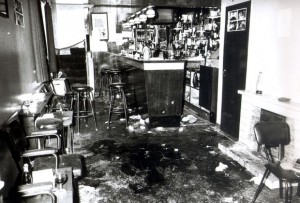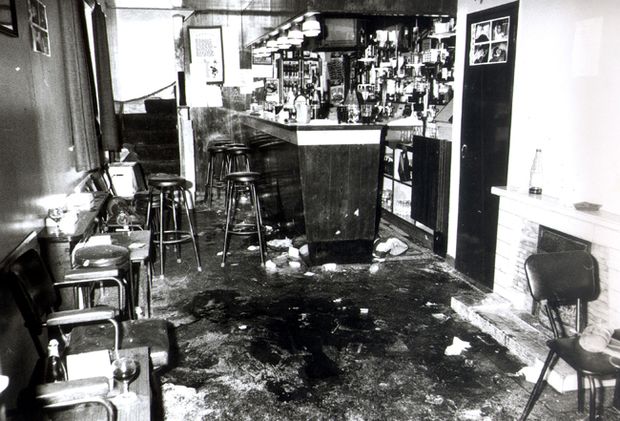Un sopravvissuto del massacro di Loughinisland, in cui sei uomini furono assassinati in un bar della Contea di Down dai lealisti, ha chiesto ai responsabili di farsi avanti
Colm Smyth è stato colpito quattro volte mentre era seduto con gli amici nel bar The Heights il 18 giugno 1994, mentre guardava la partita Italia – Irlanda valida per la Coppa del Mondo di calcio.
L’Ulster Volunteer Force (UVF) ha rivendicato la responsabilità per l’atrocità.
Nessuno è mai stato condannato per gli omicidi.
Parlando al programma “Sunday Sequence” di BBC Radio Ulster, Colm Smyth ha detto che non sentiva amarezza nei confronti dei responsabili di tale atrocità.
Ha spiegato: “La vergogna e il senso di colpa che portano dentro devono essere mille volte peggio. Non c’è nulla che possa fare agli uomini che hanno compiuto tale atrocità che potrà mai avvicinarsi a quello che hanno sentito ogni giorno della loro vita”.
Ha continuato affermando che “la verità non costa nulla” e ha chiesto a chi trattiene informazioni utili sull’attacco di farsi avanti.
Vita normale
“Tutto quello che chiedo, se stanno ascoltando, è che prendano un approccio umano e non ne facciano un processo politico, perché lì penso sia dove vengono creati tutti i nostri problemi”, ha proseguito Smyth.
“Che tu sia cattolico, protestante, lealisti o repubblicano, sei un essere umano con una madre o un padre, figlio, zia o zio. Abbiamo tutti perduto delle persone care.
“Ci sono famiglie là fuori che hanno speso ogni giorno, ogni ora degli ultimi 20 anni cercando di arrivare alla verità di quanto accaduto ai loro cari, e non potranno vivere una vita normale fino a quando ci arriveranno”.
I sei uomini uccisi nella sparatoria si chiamavano Adrian Rogan (34 anni), Malcolm Jenkinson (53), Barney Greene (87), Daniel McCreanor (59), Patrick O’Hare (35) e Eamon Byrne (39 anni).
Tutti erano civili cattolici. Greene è stata una delle vittime più anziane dell’intero conflitto nordirlandese.
Testimoni dissero che gli assassini ridevano mentre correvano alla loro macchina, pronta per la fuga.
Stiamo per essere colpiti
Smyth era rimasto in silenzio fino a poco tempo fa, quando ha deciso di scrivere un libro che descrive gli eventi di quella notte.
Ha detto al programma radiofonico che la sparatoria si era conclusa in circa 30 secondi.
“Non c’è stato alcun avvertimento, nessun stridore dei pneumatici all’esterno o qualcosa di simile. Ho visto lampi di luce nello specchio dietro il bancone, e tutto questo è accaduto in una frazione di secondo. Poi senti il rumore degli spari e mi sono voltato a guardare la porta del pub perché c’era un solo modo per entrare e una sola via d’uscita”, ha raccontato.
“Appena ho visto due uomini in passamontagna e tute sapevo caosa stava accadendo – conoscevamo tutti quell’immagine – e sapevo che il bar stava per essere attaccato.
“Le mie parole esatte sono state: «Stiamo per essere colpiti».
“Sono caduto sul pavimento piastrellato e Malcolm è caduto su di me. Mentre guardavo indietro, piegando la testa in avanti per guardare verso la porta, se n’erano andati. Era stata solo un’esperienza terribile”.
Fardello
Smyth ha detto di aver nascosto per molti anni nel profondo della sua mente il ricordo di quell’atrocità e vorrebbe dire alla gente: “Loughinisland è qualcosa che mi è accaduto, ma non sono io”.
Ricorda: “Pensavo che avrei potuto essere solo un ragazzo normale, ma sbagliavo. Loughinisland mi aveva definito in un modo molto grande, ma ho continuato a negarlo per molti anni.
“Avevo solo bisogno di vederlo da vicino e prenderne possesso dal mio punto di vista, così ho preso tutti quei diari, tutte le note, le ho scritte tutte e ho cominciato a scrivere come mi sento oggi”.
Ha detto che era importante per le famiglie delle vittime ascoltare la verità, e ha chiesto a chi possiede informazioni sul massacro di Loughinisland di parlare.
“Date a chi è rimasto una possibilità di vivere. Fatevi avanti, apritevi – perché so che molti si sentirebbero molto meglio”, ha affermato.
“Ci sarebbe di aiuto, ma sicuramente li aiuterebbe di più di quanto potrebbe essere per noi, togliendogli quel fardello dalle loro spalle”.
Tratto da BBC News
Loughinisland massacre: Survivor makes plea for truth
A survivor of the Loughinisland massacre, in which six men were shot dead in a County Down bar by loyalists, has called for those responsible to come forward.
Colm Smyth was shot four times as he sat with friends in the Heights Bar watching Ireland play Italy in the World Cup on 18 June 1994.
The Ulster Volunteer Force (UVF) claimed responsibility for the attack.
No-one has ever been convicted of the killings.
Speaking to BBC Radio Ulster’s Sunday Sequence programme on Sunday, Colm Smyth said he did not feel bitter towards those responsible for the atrocity.
He said: “The shame and the guilt that they carry must be a thousand times worse. There’s nothing I could do to the men that carried out the atrocity that will ever come close to what they’ve felt every day of their lives since that.”
He told the programme that “the truth costs nothing” and asked those with information about the gun attack to come forward.
‘Normal life’
“All I ask if they are listening is to take the human approach and not make this a political process, because I think that’s where our problems are created,” he said.
“Whether you’re Catholic, Protestant, loyalist or republican, you’re a human being with a mother or father, child, aunt or uncle. We’ve all lost people.
“There are families out there that have spent every day, every waking hour of the last 20 years trying to get to the truth of what happened to their loved ones, and they can’t live a normal life until they get there.”
The six men killed in the shooting were 34-year-old Adrian Rogan, Malcolm Jenkinson 53, Barney Greene, 87, Daniel McCreanor, 59, Patrick O’Hare, 35, and Eamon Byrne, 39.
All were Catholic civilians. Mr Greene was one of the oldest people to be killed in the Northern Ireland Troubles.
Witnesses said that the killers laughed as they ran to their getaway car.
‘We’re being hit’
Mr Smyth had remained silent about the attack until recently, when he decided to write a book detailing the events of that night.
He told the programme the shooting was over in about 30 seconds.
“There was no warning, no screeching of tyres outside or anything like that. I saw flashes of lights in the mirror behind the bar, and this is all happening in a split second. Then you hear bang, and I automatically turned to look at the door of the pub as there was only one way in, and one way out,” he said.
“I just saw two men in balaclavas and boiler suits. I knew what was happening – we all know that image – and I knew that the bar was being attacked.
“My exact words were ‘We’re being hit’.
“I fell back onto the tiled floor and Malcolm fell on top of me. As I looked back out, I bent my head forward to look towards the door and they were gone. It was just a horrendous experience.”
‘Burden’
Mr Smyth said he had put the memory of the atrocity in the back of his mind for many years, and would tell people: “Loughinisland was something that happened to me, but it wouldn’t define me.”
He said: “I thought I could just be a normal guy, but that phrase I had was actually wrong. Loughinisland defined me in a very big way but I’d just been denying it for many years.
“I just needed to get underneath it and take ownership of it from my point of view, so I took all those diaries, took all those notes, wrote them all down and started to write how I felt today.”
He said it was important for families of the victims to hear the truth, and pleaded with those with information to speak out.
“Give the living a chance to live, come forward, be open – because I know it will make them feel a lot better,” he said.
“It will help us but it will definitely help them a lot more than it will ever help us, to get that burden off their shoulders.”

